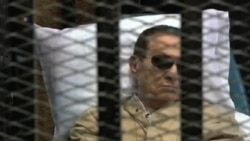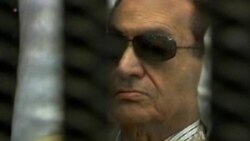Egyptians are awaiting the impending release of former president Hosni Mubarak, held in prison on charges of corruption and the death of demonstrators in 2011. While the decision by the Cairo court is based on Egyptian law, there are significant political overtones.
For three decades, former President Hosni Mubarak was the face of Egyptian power. That an Egyptian court now says his detention must end is no coincidence, according to Middle East analyst James Phillips.
"It's no secret that the army would like to see former President Mubarak released because they consider that a blot on the army's reputation - the fact that he's in jail," said Phillips.
Related video report by Elizabeth Arrott in Cairo:
Phillips says many in the military have long bristled at images of the former military leader in a cage during court proceedings and that Mubarak's release could help boost morale as the military tries to impose stability.
The move could also help appease some countries - long friendly with the former Mubarak government - which have pledged billions of dollars to Egypt.
"It could also be a barometer of the growing influence of Saudi Arabia and the Persian Gulf countries that have lobbied for Mubarak's release," said Phillips.
Yet even though Mubarak's court-ordered release may appear to be a political gambit, there's a legal basis. The court ruled that even though Mubarak still faces some charges, he has already served the maximum pre-trial detention allowed under Egyptian law.
The former leader still must appear in court to answer charges he failed to prevent the deaths of protesters demanding his ouster in 2011. But David Pollack with the Washington Institute says his court-ordered release sends a clear message to the Muslim Brotherhood and others who oppose Egypt's military-led government.
“The statement is, ‘This is a new game. It’s the Brotherhood who are the real traitors and criminals and terrorists and spies,'" said Pollack.
Increasingly in Egypt, images of Mubarak's incarceration are being replaced by those of senior Brotherhood leaders who now find themselves under arrest.
Elizabeth Arrott in Cairo also contributed to this report
For three decades, former President Hosni Mubarak was the face of Egyptian power. That an Egyptian court now says his detention must end is no coincidence, according to Middle East analyst James Phillips.
"It's no secret that the army would like to see former President Mubarak released because they consider that a blot on the army's reputation - the fact that he's in jail," said Phillips.
Related video report by Elizabeth Arrott in Cairo:
Hosni Mubarak
Hosni Mubarak- February 11, 2011: Egyptian President Hosni Mubarak resigns amid massive protests across Egypt
- April 13, 2011: Authorities detain Mubarak
- May 24, 2011: Officials say Mubarak will stand trial for corruption and deaths of anti-government protesters
- August 3, 2011: Mubarak's trial starts, he pleads innocent
- June 2, 2012: Mubarak sentenced to life in prison for complicity in killing of protesters in 2011 uprising
- January, 2013: Court allows Mubarak to appeal and orders a retrial
- August 19, 2013: Mubarak acquitted of corruption charge
- August 21, 2013: Egyptian court orders Mubarak to be released. Faces retrial on charges of complicity in the killing of the protesters
- August 22, 2013: Mubarak is released from prison and placed under house arrest
The move could also help appease some countries - long friendly with the former Mubarak government - which have pledged billions of dollars to Egypt.
"It could also be a barometer of the growing influence of Saudi Arabia and the Persian Gulf countries that have lobbied for Mubarak's release," said Phillips.
Yet even though Mubarak's court-ordered release may appear to be a political gambit, there's a legal basis. The court ruled that even though Mubarak still faces some charges, he has already served the maximum pre-trial detention allowed under Egyptian law.
Mohamed Badie
Mohamed Badie- Elected eighth supreme guide of the Muslim Brotherhood in 2010
- Became member of Brotherhood's Guidance Bureau in 1996 and International Guidance Bureau in 2007
- Professor of veterinary medicine at the University of Beni Suef
- Sentenced to 15 years in prison in 1965 with other Brotherhood members
- Served 9 years, has been imprisoned several other times
- Born in 1943
“The statement is, ‘This is a new game. It’s the Brotherhood who are the real traitors and criminals and terrorists and spies,'" said Pollack.
Increasingly in Egypt, images of Mubarak's incarceration are being replaced by those of senior Brotherhood leaders who now find themselves under arrest.
Elizabeth Arrott in Cairo also contributed to this report






